How does school phobia or fear of school develop?
The reasons that lead to school phobia vary greatly and often reveal other disorders that are less obvious to identify. In this context, it appears that some young people are more vulnerable than others to developing school phobia. Life experiences, family vulnerability, parental attitudes, temperament, etc. constitute a set of factors to be taken into account in order to understand the development of phobia.

Environmental factors behind the fear of school
Environmental factors include the young person’s social and educational background. If he is the victim of verbal aggression, harassment at school, or if he is culturally different, he will be more likely to develop a school phobia than one of his peers who are better integrated by his group of friends. If they have difficulties adapting to the group or if they suffer from dyslexia (a specific language acquisition disorder), it will be even more difficult for them to keep up with the demands of school and the pace of lessons. If the school phobia is clearly identified with a specific school-related element, then it is a simple phobia. Something may have happened in the school with the teacher and this creates a specific phobia towards the teacher. The child ends up avoiding school to avoid exposure to his or her fear. On the other hand, if the identification of difficulties is much more diffuse, and is characterised by the avoidance of social interaction, by a fear of being criticised or mocked, then the phobia is social. These young people are convinced that they are constantly being judged and their gaze is inquisitive.
Individual causes of school phobia
Individual causes do not necessarily include situations specifically related to school. It may be a question of a young person’s temperament. If a young person is sensitive and not very sociable, he or she will be more likely to show an anxiety disorder than peers who are energetic, expressive or angry. Separation anxiety is another common feature. It is characterised by excessive anxiety when the young person is separated from the people to whom he or she is mainly attached (often the parents, especially the mother). This anxiety may manifest itself in the fear that the parents may die. The child then seeks to control the integrity of the mother at all times, something that he/she will not be able to do at school and which will prevent him/her from concentrating. The anxiety in the child is often found in one of the parents. This is called “mirror separation anxiety” because it is transgenerational and is built on a strong educational and relational mode. This has no other consequence than to self-reinforce the child’s weakened psychological functioning.
The role of the environment in the development of fear of school
The environment, and particularly parents, play a decisive role in the development of school phobia. If the first reactions to the young person’s refusal to go to school often consist of attempts to reassure them by focusing on the positive aspects of school or, conversely, by resorting to punishment, there is a gradual tendency towards a form of resignation or even tolerance of the child’s absenteeism. When school refusal is maintained over time, parents end up making arrangements to maintain schooling without the child having to go to school. This may involve home tutoring or correspondence courses. However, although these may be solutions that allow the child to live better with the disorder at the time, it is still avoidance that appears to be legitimised and structured by the family sphere. As a result, the anxiety felt and the panic behaviours are reinforced and the idea of returning to school becomes increasingly inconceivable. Studies show that two types of parent-child interaction would, to a certain extent, favour the development of school phobia and the break with school, namely
- Children who are bossy and demanding with their parents but shy outside
- Passive children in all relationships at school and at home
Generalized anxiety and fear of school
Generalized anxiety (or hyperanxiety) is the excessive fear of performance evaluation and failure. The young person places him/herself in a negative anticipation of events leading to a strong devaluation. Within this hyper-anxiety, performance anxiety can be identified, i.e. the child has abilities but loses all his means!
The evolution of school phobia depends on the severity of the anxiety disorder. It is important to identify it early because any psychopathological disorder has an influence on the child’s development. As an adult, the child may develop a personality disorder, agoraphobia, depressive disorders, and his or her social relationships will be reduced. This impact will be all the stronger if the disorder has been present for a long time and at an early stage.


